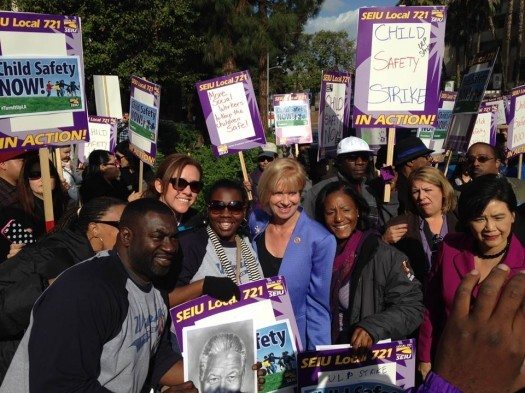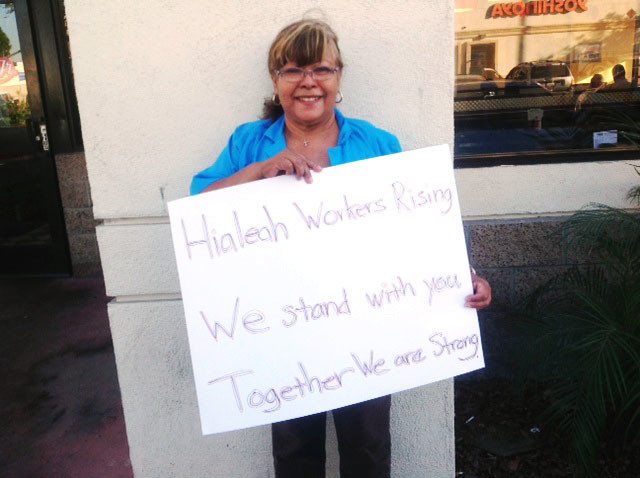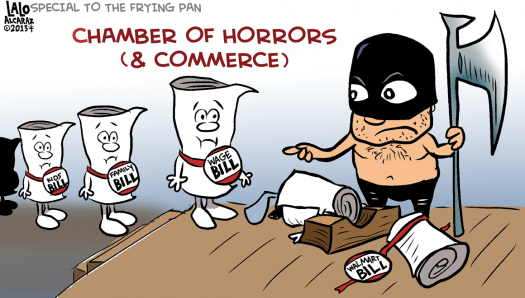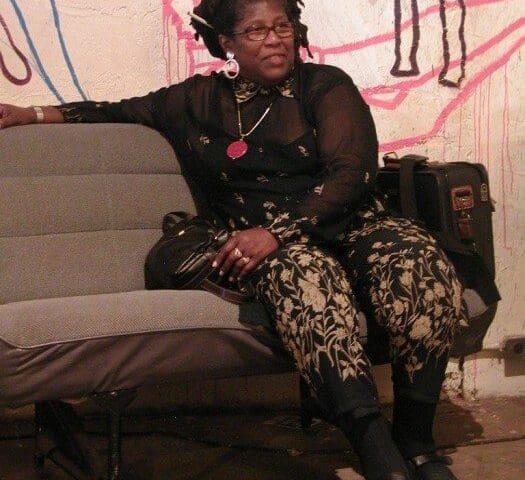

Yesterday Mother Jones’ Kevin Drum drew some disheartening conclusions from the budget deal worked out between Congressman Paul Ryan and Senator Patty Murray – the much-lauded compromise that is headed for passage, barring some last-minute Tea Party putsch in the House. Sure, Drum allowed, the budget’s entitlement cuts were almost too tiny to notice, and along the way some sequester reductions were restored. But that wasn’t the point.
“Two years ago,” Drum wrote, “Ryan’s budget was basically at the outer limit of mainstream conservative wish lists. Today it looks tame . . . Republicans have massively changed the spending conversation since 2010. Austerity has won.”
The fact remains that many in the political media are applauding the new budget as a triumph of realpolitik simply because it defuses the threat of a determined minority taking down the world economic order – a threat that has become the new baseline in budget negotiations.


Several leading port trucking companies have taken a bold new position in the ongoing battle over whether or not they are misclassifying drivers as independent contractors. In recent filings with the U.S. District Court, they have attempted to position themselves as beyond the reach of California’s employee protection laws. In effect, they are saying that whether or not they are misclassifying drivers there is nothing the State of California can do about it.
Some background: Of the approximately 12,000 port truck drivers in Southern California – about 110,000 nationwide – the overwhelming majority are improperly classified as “independent contractors.” This has dramatic repercussions, as these low-income, mostly immigrant drivers are thereby denied basic workplace rights and protections: no minimum wage or overtime or OSHA protections, no disability or workers comp or unemployment insurance, no legal right to organize a union. Instead, drivers are saddled with payments for the trucks they drive,
» Read more about: Trucking Companies to California: Your Puny Laws Don’t Apply to Us »
 The Los Angeles County Department of Children and Family Services (DCFS) strike has been on my mind. Prior to leaving this April after nearly 12 years of service, I thought I would retire from DCFS. Even though I am no longer employed by DCFS and no longer in Los Angeles, I still feel connected to the social workers that do this work.
The Los Angeles County Department of Children and Family Services (DCFS) strike has been on my mind. Prior to leaving this April after nearly 12 years of service, I thought I would retire from DCFS. Even though I am no longer employed by DCFS and no longer in Los Angeles, I still feel connected to the social workers that do this work.
The strike started on December 5 when contract negotiations stalled. An unresolved issue is that of the Children’s Social Worker caseload for children and families who have abuse or neglect issues. High caseloads have been a long-standing issue even before this round of negotiations. One child is counted as one case. A child’s case goes through several service phases – from investigation to adjudication to offering services to maintain a child safely at home, or to reunify a the child with his parents once a family interfaces with DCFS.
» Read more about: Why I Support the Social Workers Strike »


“Give and it shall be given unto you is still the truth about life.” 
D.H. Lawrence said that almost a century ago. Now we can read scientific evidence that this statement is true. How much we have or how much we earn does not make us happy. How we spend what we have is what makes us happy and the more that spending connects us to other human beings, the happier we are. Giving – to another person or through a charitable organization – is the deepest connection we can make.
While the conclusions of Happy Money, a book by research academics Elizabeth Dunn and Michael Norton, demonstrate that happiness and giving are closely connected, they also indicate that giving boosts our odds of living longer and healthier. Furthermore, the authors say, when a man in an experimental situation gave more to someone needy,


Last week Los Angeles County Children’s Social Workers went on strike after contract talks with the county broke down. At the heart of the conflict are claims made by the CSWs that the Department of Public Social Services and the L.A. County Board of Supervisors have refused to include in a new labor agreement a binding commitment to reduce the number of employee caseloads. The CSWs, represented by the Service Employees International Union Local 721, say the caseload numbers “greatly exceed acceptable industry standards.”
This morning at 11 a.m., union members, along with community and faith leaders, will take their complaints to field offices of the five supervisors: Gloria Molina, Zev Yaroslavsky, Don Knabe, Mark Ridley-Thomas and Mike Antonovich. The chief focus of Monday’s strike rallies will be Molina’s El Monte office, at 3400 Aerojet Avenue.
Local 721 claims the support of U.S. Congresswomen Janice Hahn and Judy Chu,


November, 2013 was not a good month to be a Walmart corporate executive.
The headaches for the nation’s largest employer of low-wage workers began November 18, when the National Labor Relations Board found that Walmart illegally threatened, disciplined and fired employees over last year’s Black Friday strikes and protests. The finding was the first step in an NLRB complaint asserting that the retail giant violated workers’ rights.
The Black Friday protests have been a driving force behind the core demand by Walmart employees that the company raise the annual earnings for sales associates above the federal poverty line.
That NLRB bombshell soon snowballed into a public relations disaster when, on the same day, news broke that a Canton, Ohio Walmart store had instituted a Thanksgiving food drive on behalf of store employees unable to afford a holiday meal. The Canton story was subsequently credited with reigniting the congressional fight for the first increase in the national $7.25-per-hour minimum wage since 2007.


 Thursday’s one-day strike by fast-food workers may have received relatively little media coverage, but the doubling of strike sites to 100 cities over the previous nationwide actions showed the movement for higher wages and union recognition is growing.
Thursday’s one-day strike by fast-food workers may have received relatively little media coverage, but the doubling of strike sites to 100 cities over the previous nationwide actions showed the movement for higher wages and union recognition is growing.
The largest actions were held in New York City and Chicago, where, according to the Guardian UK, “hundreds of protesters gathered outside a McDonald’s at 6:15 a.m. as a large ‘Christmas Grinch’ ambled about in freezing temperatures.”
According to the Seattle Times, about 150 demonstrators rallied at City Hall following an all-day march in icy weather from neighboring SeaTac. In Los Angeles, rallies were held at dawn in South Los Angeles at a Manchester Boulevard McDonald’s, as well as a Sunset Boulevard McDonald’s in Silver Lake, at noon. The movement for fast-food employee rights has the twin goals of raising starting salaries to $15 an hour (at present they typically begin at $7.25) and to win the right to organize workers into unions.
» Read more about: Fast-Food Workers Movement Pushes Ahead »


The California Chamber of Commerce represents more than 13,000 businesses, from companies such as Microsoft and Walt Disney, to local companies with small numbers of employees. From its K Street headquarters in Sacramento, the “Cal Chamber,” as it’s colloquially known, analyzes some 3,000 pieces of legislation every year. In the past 10 years, 341 of 353 — nearly 97 percent — of the bills opposed by the California Chamber of Commerce failed to become law. The vast majority of these were never passed by the Legislature and sent to the Governor. Instead, they were killed in committee or voted down by the Legislature or amended to take out provisions opposed by the chamber.
The chamber’s weapon of choice is its highly publicized “Job Killers List,” a roll call of bills the chamber claims threaten the interests of business, though its press releases tend to stress the bills’ menace to California’s economy and its workers’ jobs.
» Read more about: DOA: Behind the Chamber of Commerce’s “Job Killers” List »

the age of the innerview dawns and the need
to be first is muted by a
multitude of passings/desire honed so sharp
the edges bleed, lips and hands
assume a silent patience/at rest as a savage
brilliance is reborn in this ancient ravaged griot
who am i? what am i? are no longer important questions.
knowing that i am is finally enough
like discovering dessert is delicious following a disastrous
meal, a sweetness that reawakens
the palate, or finding that one’s chalice is unexpectedly
filled with elixir of euphoria
and i stumble happily into the cornucopia, arms
outstretched, upturned, drunk
my heart athrum, bones full samba. the night
blesses me with his constellations
baptizes me with his deathless autumnal chill
and i invade the moody indigo
full-throated and singing


Over the past week, since Wanda Coleman’s untimely death at 67, admirers have been remembering her formidable body of work, her electrifying readings – and her identification with the city she called her home. Growing up in Watts in the 1950s, she experienced not only discrimination but also taunts by other black children because of her dark skin and untamable hair—which she describes in Bathwater Wine as “threads within coils within knots within twists.”
As a child, she took refuge in books, although not necessarily in libraries. (One poem describes a white librarian policing her through the stacks.) Her love of language sustained Coleman through her struggles to earn a living as a single mother, to cope with the death of a son and her own ill health. She did not choose an easy path. Furthermore, the West Coast is a hard place for any poet to make her name.
But Los Angeles gave Coleman a vocabulary and a landscape that she in turn made her own.
» Read more about: can’t let go of it: Appreciating Wanda Coleman »